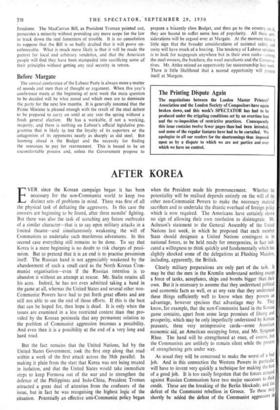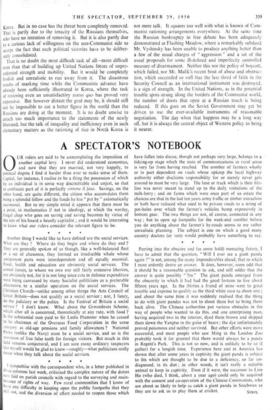AFTER KOREA E VER since the Korean campaign began it has
been necessary for the non-Communist world to keep two distinct sets of problems in mind. There was first of all the physical task of defeating the aggressors. In this case the answers are beginning to be found, after three months' fighting. But there was also the task of scotching any future outbreaks of a similar character—that is to say open military attacks in a limited theatre—and simultaneously weakening the will of Communists to undertake such murderous adventures. In this second case everything still remains to be done. To say that Korea is a mere beginning is no doubt to risk charges of pessi- mism. But to pretend that it is an end is to practise pessimism itself. The Russian hand is not appreciably weakened by the abandonment of such a small card as the North Korean Com- munist organisation—even if the Russian intention is to abandon it without an attempt at rescue. Mr. Stalin retains all his aces. Indeed, he has not even admitted taking a hand in the game at all, whereas the United States and several other non- Communist Powers have had to put forth great efforts and are still not able to see the end of those efforts. If this is the best that can be hoped for, then hope is dead. It is only when the issues are examined in a less restricted context than that pro- vided by the Korean peninsula that any permanent solution to the problem of Communist aggression becomes a possibility. And even then it is a possibility at the end of a very long and bard road.
But the fact remains that the United Nations, led by the United States Government, took the first step along that road within a week of the first attack across the 38th parallel. In making it plain from the start that Korea was not being treated in isolation, and that the United States would take immediate steps to keep Formosa out of the war and to strengthen the defence of the Philippines and Indo-China, President Truman attracted a great deal of attention from the confusers of the issue, but in fact he was recognising the highest logic of the situation. Potentially an effective anti-Communist policy began when the President made his pronouncement. Whether the potentiality will be realised depends entirely on the will of the other non-Communist Powers to make the necessary material sacrifices and to undertake the drastic overhaul of foreign policy which is now required. The Americans have certainly shown no sign of allowing their own resolution to disintegrate. Mr. Acheson's statement to the General Assembly of the United Nations -last week, in which he proposed that each member State should designate a United Nations contingent in its national forces, to be held ready for emergencies, in fact indi- cated a willingness to think quickly and fundamentally which has slightly shocked some of the delegations at Flushing Meadow, including, apparently, the British.
Clearly military preparations are only part of the task. It may be that the men in the Kremlin understand nothing except a force of tanks, aeroplanes, ships and bombs bigger than their own. But it is necessary to assume that they understand political and economic facts as well, or at any rate that they understand these things sufficiently well to know when they possess an advantage, however specious that advantage may be. They know, for example, that the non-Communist hand in the Korean game contains, apart from some large promises of liberty and prosperity, which may be only imperfectly understood by Korean peasants, three very unimpressive cards—some American economic aid, an American occupying force, and Mr. Syngluan Rhee. The hand will be strengthened at once, of course, Out the Communists are unlikely to remain silent while the process of strengthening gets under way.
As usual they will be concerned to make the worst of a bad job. And in this connection the Western Powers in particular will have to invent very quickly a technique for making the best of a good job. It is too easily forgotten that the forces arrayed against Russian Communism have two major successes to their credit. These are the breaking of the Berlin blockade, and the defeat of the Commtnist rebellion in Greece. To these may shortly be added the defeat of the Communist aggressors it Korea. But in no case has the threat been completely removed. That is partly due to the tenacity of the Russians themselves, who have no intention of removing it. But it is also partly due to a curious lack of willingness on the non-Communist side to accept the fact that such political victories have to be deliber- ately consolidated. That is no doubt the most difficult task of all—more difficult even than that of building up United Nations forces of unpre- cedented strength and mobility. But it would 'be completely foolish and unrealistic to run away from it. The disastrous results of marking time while the Communists advance have already been sufficiently illustrated in Korea, where the task of restoring even an unsatisfact6ry status quo has proved very expensive. But however distant the goal may be, it should still not be impossible to cut a better figure in the world than the Russians are doing at the moment. It is no doubt unwise to attach too much importance to the statements of the newly liberated, but the talk of inequality and inefficiency even in such elementary matters as the rationing of rice in North Korea is not mere talk. It squares too well with what is known of Com- munist rationing arrangements everywhere. At the same time the Russian bankruptcy in free debate has been adequately demonstrated at Flushing Meadow, where a remarkably subdued Mr. Vyshinsky has been unable to produce anything better than a few of the usual charges of " aggression " and a set of the usual proposals for some ill-defined and imperfectly controlled measure of disarmament. Neither this nor the policy of boycott, which failed, nor Mr. Malik's recent bout of abuse and obstruc- tion, which succeeded so well that the last shred of faith in the Security Council as an international instrument was destroyed, is a sign of strength. In the United Nations, as in the potential trouble spots strung along the borders of the Communist world, the number of doors that open at a Russian touch is being reduced. If this the on the Soviet Government may yet be driven to use the ever-available instruments of reasonable negotiation. The day when that happens may be a long way off, but it is always the central object of Western policy to bring it nearer.



























 Previous page
Previous page